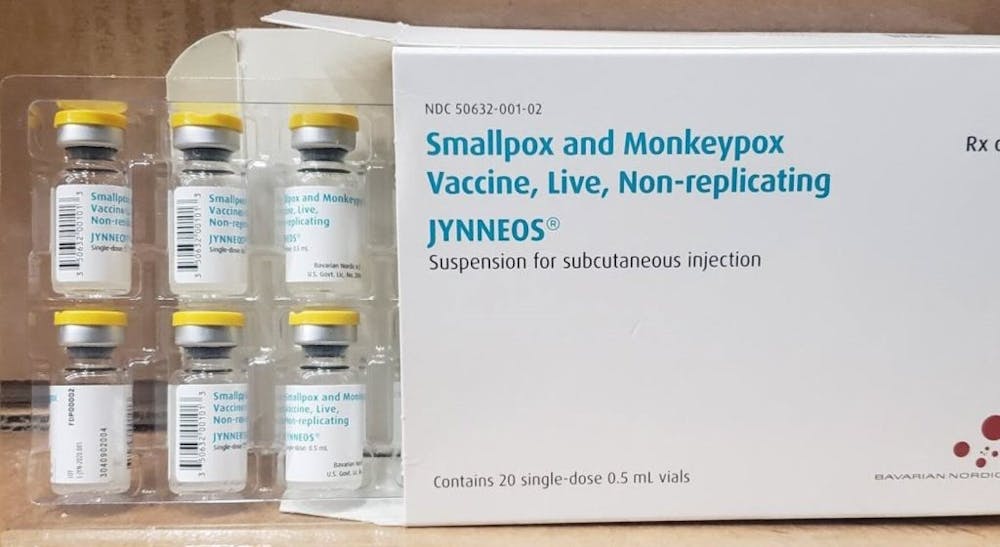The Richmond and Henrico health districts' guidelines for eligibility to receive a monkeypox vaccine have expanded to include anyone with multiple sexual partners in the past two weeks.
Previously, only men who have sex with men and had multiple male anonymous partners were eligible for vaccination in Virginia. The Centers for Disease Control and Prevention have reported that monkeypox cases are mainly present in LGBTQ+ communities, but it also emphasizes that anyone can get monkeypox.
Casey Butler, the associate director of LGBTQ+ campus life, said looking at identity was oversimplifying who was affected by the monkeypox virus.
“I think we need to look at practice instead of identity,” Butler said. “There are many people who are not open with their identities, but outness isn’t thought about a lot in health work.”
The increase in cases among the LGBTQ+ community and stigma toward those who were assigned male at birth is reminiscent of that during the HIV/AIDs crisis, Butler said.
Vaccines are limited in supply in Virginia and across the country, said Catherine Long, public information officer for Richmond and Henrico Health Districts. There is a national shortage of vaccines, but the Biden administration has made plans to purchase 5.5 million vaccines from a manufacturer in Denmark and hopes the rollout will be sometime later this year.
There are two different vaccines that can prevent monkeypox that had been developed before the 2022 outbreak.
“JYNNEOS is the only vaccine being distributed in the U.S. at the moment,” Long said. “It is a two-dose vaccine, and it is impossible to get monkeypox from the vaccine.”
The health districts received 937 vaccines as of last week and only have 180 remaining, Long said. The shipments of vaccines are very small and clinics go through them quickly, she said. About 4,000 people were waiting for vaccination as of a week ago, Long said.
“We have clinics in Henrico east, Henrico west, and the city of Richmond,” Long said. “We are also sharing vaccine supply with clinics who serve high-risk communities.”
Virginia Department of Health officials are encouraging anyone who is at higher risk to fill out a monkeypox vaccine request form. This form does not guarantee vaccination. It asks about sexual activity, travel and contact with potential monkeypox cases. Once a vaccine is available, the VDH will contact people on the waitlist by email and text.
Senior Donte Thompson said monkeypox vaccines aren’t as accessible as they should be.
Enjoy what you're reading?
Signup for our newsletter
“The form said they would contact you if you are considered high priority,” Thompson said. “But a lot of my friends have filled it out and none of us have heard back.”
Those who have been in close contact with a monkeypox patient should talk with their health care provider. People who have had extensive skin-to-skin contact with someone with a known case of monkeypox are considered to have a high-degree exposure, and people who don’t know who they’ve been in contact with since their exposure are considered to have a low- to intermediate-degree exposure, according to the VDH.
Those with high-degree contact with monkeypox should get the vaccine within four days of exposure, according to the VDH. Those who receive the vaccine after that, but are still within two weeks of the exposure may see a reduction in symptoms, but there is no guarantee of prevention.
Unprotected contact with the skin, bodily fluids or contaminated materials of a person infected with monkeypox is considered a high-risk contact. Health officials recommend getting a post-exposure vaccination and monitoring symptoms for up to 21 days after initial exposure.
Being within six feet of a person with monkeypox for three hours or more without masks is considered intermediate risk exposure. The department recommends monitoring any symptoms for 21 days after the exposure to determine if a vaccine is necessary.
Low-risk exposure is being within six feet of someone with monkeypox without a mask for less than 3 hours.
The CDC partnered with five commercial laboratory companies to start supplying monkeypox tests across the country. While these are commercial testing sites that charge for testing, Biden administration officials wrote that they are working to make testing more accessible.
Once someone tests positive, they will be contacted by an epidemiologist from the VDH who will walk them through the process of quarantining, signing up for symptom monitoring and contact tracing.
“Testing for monkeypox is different than COVID,” Long said. “It requires a swab of the lesions or rash — that means we can only test those who have a rash or lesion.”
Most cases are identified in sexually transmitted infections clinics because of the areas the lesions show up in, Long said.
Those who are interested in getting a monkeypox vaccine should fill out this form or call 804-205-3501.
Those who are interested in making an appointment at an STI clinic in Richmond can call 804-482-5500 from 8-12 pm. The clinic is located at 400 E. Cary Street, Richmond, VA, 23219.
Contact news writer Amy Jablonski at amy.jablonski@richmond.edu.
Support independent student media
You can make a tax-deductible donation by clicking the button below, which takes you to our secure PayPal account. The page is set up to receive contributions in whatever amount you designate. We look forward to using the money we raise to further our mission of providing honest and accurate information to students, faculty, staff, alumni and others in the general public.
Donate Now



